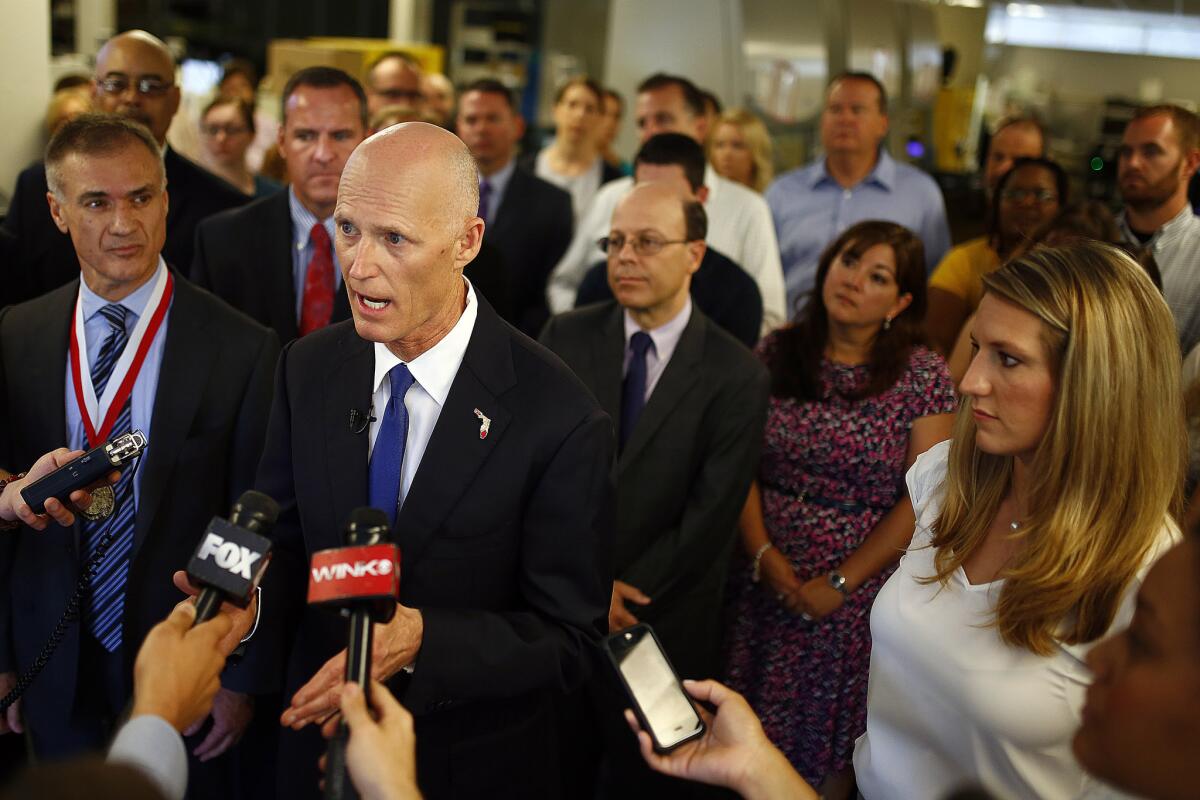State governments lament that citizens are actually getting health coverage

Florida Gov. Rick Scott, still costing his citizens money on Medicaid.
One of the more bizarre spectacles of U.S. government in the modern age is the sight of political leaders complaining that a public program is actually working.
On Monday, Politico delivered a striking case in point. The subject was Obamacare, or more specifically the expansion of Medicaid through which millions of low-income families receive health coverage. According to author Rachana Pradhan, in many states that expanded Medicaid and even some that rejected expansion under the Affordable Care Act, enrollment has significantly exceeded projections.
To some political leaders, for some reason, this is supposed to be a bad thing. Some Republican governors are in effect calling it “an ‘I told you so’ moment,” Pradhan reports.
Well, yes, but not in the way they mean. What they were told was that the pent-up demand for health coverage was immense, especially among low-income Americans trapped in the utterly dysfunctional and unresponsive individual insurance market. That’s turned out to be true. That the demand exceeded projections tells us only that far more people were unserved or underserved than we thought.
In Michigan, for instance, first-year enrollment was projected at 323,000, but enrollment topped out at 605,000. Illinois expected 199,000, and has ended up (so far) with 634,000. Ohio expected 366,000 and so far has signed up 485,000.
The indispensable Charles Gaba observes that there are four reasons why enrollments might exceed projections. These are underestimates of: how many people were already eligible under pre-ACA rules; how many of them would enroll even without expansion (this is known as people coming out of the woodwork, or the “woodworker effect”); how many people would be eligible for the expansion; and how many of them would enroll. It looks like many, if not most, state governments miscounted all or most of these categories.
Typically, Republican office holders and conservative pundits depict the trend as a government program out of control, rather than one that turned out to be more desperately needed than anticipated. “The expansion of Obamacare will cost our state taxpayers $5 billion,” Florida Gov. Rick Scott told Politico.
A couple of points about this. First of all, Florida hasn’t expanded Medicaid. Second, Scott’s figure is a 10-year total. Third, the federal government is picking up 100% of the tab for Medicaid expansion through 2016, sliding down to 90% by 2020 and beyond; Florida is paying a higher percentage of the cost of residents who have signed up under the pre-ACA rules.
Fourthly, Scott, a former healthcare executive, is wholly responsible for turning the issue of Medicaid expansion in his state into a personal cabaret act, in which his own citizens pay the cover charge. (We featured Scott in our recent look at the costs of anti-Obamacare fanaticism.)
Finally, and most important, Medicaid expansion is one of those government initiatives that pays for itself. According to a recent survey by the Robert Wood Johnson Foundation of the expansion states Arkansas, Colorado, Kentucky, Michigan, New Mexico, Oregon, Washington and West Virginia, the offsetting gains come in several categories.
Populations that were enrolled in Medicaid under the old rules and skimpier federal reimbursement rates are now enrolled in the broader program at 100%. Some of the states had been paying out of their own budgets to cover residents who are now covered by the feds. Some of the states have seen gains in revenue from expanded health plans.
That’s not counting the economic bounty reaped by states that have reduced their proportion of uncompensated healthcare. Kentucky alone expects “a significant positive cumulative impact of $30.1 billion” to its economy through 2021. That’s twice the impact the state expected when it first pondered Medicaid expansion in 2013.
Smart state government leaders understand that by failing to expand Medicaid, they’re allowing their own taxpayers’ dollars to flow out of their own states and benefit others. Rick Scott isn’t a smart government leader.
It should go without saying that political leaders who do their utmost to prevent their own citizens from taking advantage of a government program aren’t qualified to hold public office. Florida enacted rules interfering with ACA outreach efforts, as did several other GOP-controlled states. In Congress, GOP lawmakers hectored government officials who were spending money to sign up eligible people.
Who do these government officials think they’re representing?
Keep up to date with the Economy Hub. Follow @hiltzikm on Twitter, see our Facebook page, or email mhiltzik@latimes.com.







